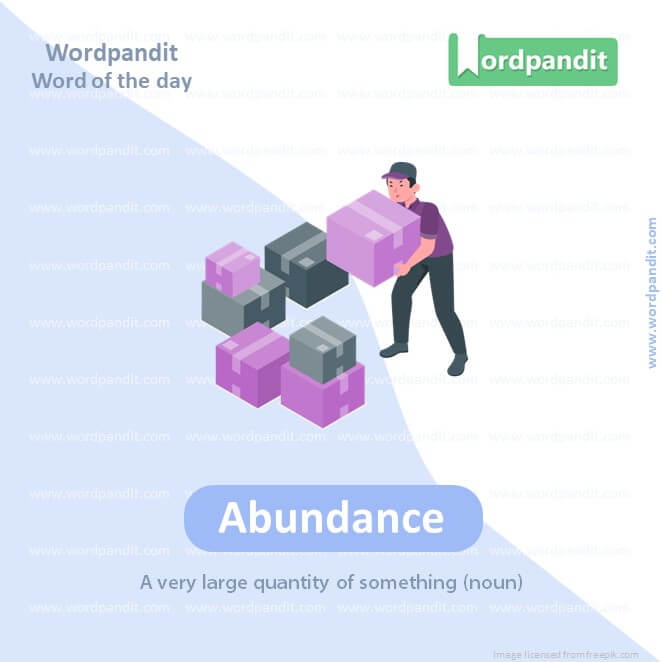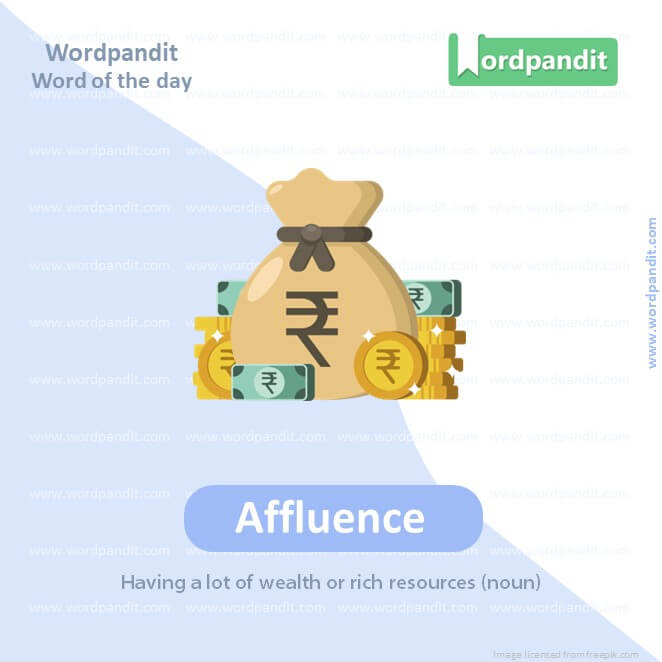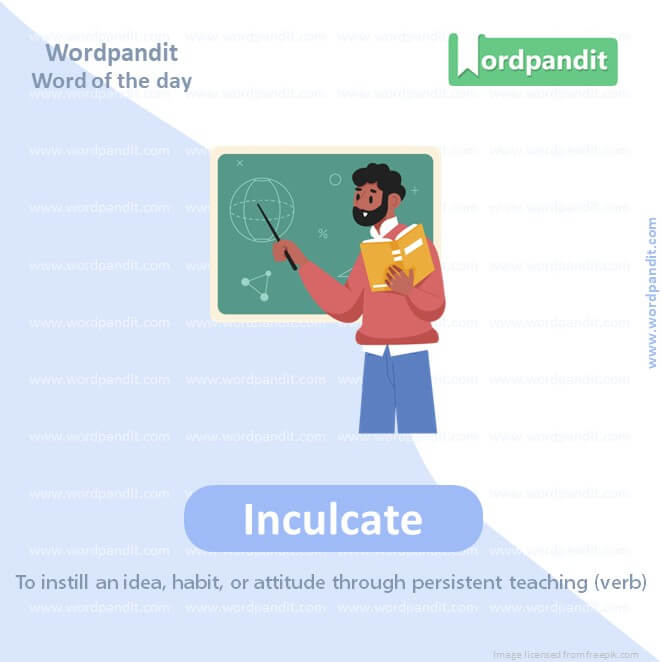Daily Vocabulary Words: List of Daily Used Words in Leading Indian Newspapers
Hi there. Welcome to this special section @ Wordpandit. Our endeavour here is straightforward: highlighting daily vocabulary words that you would come across in leading newspapers in the country. We have included the following newspapers in our selection:
• The Times of India
• The Economic Times
• Hindustan Times
• Mint
• Indian Express
We are putting in extensive work to develop your vocabulary. All you have to do is be regular with this section and check out this post daily. This is your repository of commonly used words; essentially, we are posting a list of daily used words. Hence, this has significant practical application as it teaches you words that are commonly used in leading publications mentioned above.
Visit the website daily to learn words from leading Indian newspapers.

WORD-1: Abundance
CONTEXT: But in their current role as parents, many are affluent and inclined to give their children lives of abundance and opportunities.
SOURCE: Live Mint
EXPLANATORY PARAGRAPH: Imagine having so many toys that they fill up your whole room and you can’t play with all of them. That’s “abundance,” which means having a lot of something.
MEANING: A very large quantity of something (noun).
PRONUNCIATION: uh-BUHN-duhns
SYNONYMS: plenty, profusion, surplus, overflow, wealth
USAGE EXAMPLES:
1. The garden had an abundance of flowers in spring.
2. She was blessed with an abundance of love and support from her family.
3. The lake is known for its abundance of fish.
4. There was an abundance of food at the Thanksgiving dinner.

WORD-2: Affluence
CONTEXT: But in their current role as parents, many are affluent and inclined to give their children lives of abundance and opportunities.
SOURCE: Live Mint
EXPLANATORY PARAGRAPH: Imagine living in a big house with everything you want, like toys, games, and nice clothes. That’s “affluence,” which means having a lot of money and things.
MEANING: Having a lot of wealth or rich resources (noun).
PRONUNCIATION: AF-loo-uhns
SYNONYMS: wealth, prosperity, richness, opulence, fortune
USAGE EXAMPLES:
1. The neighborhood is known for its affluence and luxurious homes.
2. His affluence allowed him to travel the world in style.
3. The family enjoyed the benefits of affluence, living in comfort.
4. Despite their affluence, they remained humble and generous.

WORD-3: Perpetuate
CONTEXT: Yet, this well-intentioned affluence seems to perpetuate a culture of excess, making it a challenge to inculcate values of moderation and gratitude in today’s youth.
SOURCE: Live Mint
EXPLANATORY PARAGRAPH: Imagine you keep passing on a story to your friends, and they tell it to their friends, and so on. You’re “perpetuating” that story, which means keeping it going.
MEANING: To make something continue or last for a long time (verb).
PRONUNCIATION: per-PETCH-oo-ate
SYNONYMS: continue, maintain, preserve, keep alive, prolong
USAGE EXAMPLES:
1. The teacher aimed to perpetuate the tradition of kindness in the classroom.
2. The media often perpetuates stereotypes about certain groups.
3. We must not perpetuate harmful habits that damage the environment.
4. Family gatherings help perpetuate the bond between relatives.

WORD-4: Inculcate
CONTEXT: Yet, this well-intentioned affluence seems to perpetuate a culture of excess, making it a challenge to inculcate values of moderation and gratitude in today’s youth.
SOURCE: Live Mint
EXPLANATORY PARAGRAPH: Imagine repeating the idea of sharing with your friends over and over until they remember it well. That’s “inculcate,” which means teaching someone by repeating something many times.
MEANING: To instill an idea, habit, or attitude through persistent teaching (verb).
PRONUNCIATION: IN-kul-kayt
SYNONYMS: instill, teach, implant, imbue, indoctrinate
USAGE EXAMPLES:
1. The parents tried to inculcate good manners in their children.
2. The coach wanted to inculcate a sense of discipline in the players.
3. Schools play a vital role in inculcating values of kindness and respect.
4. The instructor aimed to inculcate a love for reading in the students.

WORD-5: Enamoured
CONTEXT: Creams and lotions, once modest objects of utility found in hand-me-downs and bargain store treasures, now signify prestige and exclusivity, serving the vanities of a generation enamoured of flawless exteriors.
SOURCE: Live Mint
EXPLANATORY PARAGRAPH: Imagine seeing a cute puppy and feeling so much love for it right away. You’re “enamoured,” which means having a strong liking or love for something.
MEANING: Strongly in love with or fascinated by something (adjective).
PRONUNCIATION: en-AM-erd
SYNONYMS: captivated, charmed, infatuated, besotted, smitten
USAGE EXAMPLES:
1. She was enamoured with the idea of living in a small, quiet town.
2. The tourists were enamoured by the beauty of the old castle.
3. He became enamoured with her sense of humor and kindness.
4. The children were enamoured by the magician’s amazing tricks.
WORD-6: Anecdotes
CONTEXT: She shrank from those anecdotes of thrift, for they sounded out of sync with her modern world.
SOURCE: Live Mint
EXPLANATORY PARAGRAPH: Imagine a funny story about a time your friend tripped while playing soccer. That’s an “anecdote,” which means a short and interesting story about something that happened.
MEANING: Short, amusing, or interesting stories about real events (noun, plural).
PRONUNCIATION: AN-ik-dohts
SYNONYMS: stories, tales, narratives, accounts, recollections
USAGE EXAMPLES:
1. The teacher shared funny anecdotes to make the lesson more engaging.
2. His book is filled with interesting anecdotes from his travels.
3. She loves telling anecdotes about her childhood adventures.
4. The anecdotes about their friendship made everyone laugh.
WORD-7: Incensed
CONTEXT: That set off a firestorm among Republican attorneys general in 17 states, who filed a lawsuit to block the rule, incensed at the idea that an employer would have to accommodate leave for a procedure they might personally oppose.
SOURCE: Live Mint
EXPLANATORY PARAGRAPH: If your favorite toy breaks, and you’re really, really mad about it, you’re “incensed.” It means being very angry.
MEANING: Extremely angry or furious (adjective).
PRONUNCIATION: in-SENSD
SYNONYMS: enraged, infuriated, outraged, furious, irate
USAGE EXAMPLES:
1. The fans were incensed when the referee made a bad call.
2. She was incensed to find her car scratched in the parking lot.
3. The community was incensed by the unfair decision of the city council.
4. He became incensed when he realized someone had stolen his wallet.
WORD-8: Loath
CONTEXT: These Republican-led states are loath to recognize federal authority on any issue that runs afoul of their conservative crusade.
SOURCE: Live Mint
EXPLANATORY PARAGRAPH: Imagine really not wanting to eat a vegetable you dislike, so you push your plate away. You’re “loath” to eat it, which means you don’t want to do something.
MEANING: Not willing or reluctant to do something (adjective).
PRONUNCIATION: lohth
SYNONYMS: reluctant, unwilling, hesitant, averse, disinclined
USAGE EXAMPLES:
1. She was loath to admit she had made a mistake.
2. He was loath to leave the party early because he was having so much fun.
3. They were loath to take on more work due to their busy schedules.
4. The child was loath to try the new vegetable for dinner.
WORD-9: Crusade
CONTEXT: These Republican-led states are loath to recognize federal authority on any issue that runs afoul of their conservative crusade.
SOURCE: Live Mint
EXPLANATORY PARAGRAPH: Imagine working really hard to clean up all the parks in your town because you want to keep them beautiful. That’s your “crusade,” which means a strong effort to achieve something important.
MEANING: A strong, organized effort to achieve a specific goal, often for social change (noun). To take part in such an effort (verb).
PRONUNCIATION: kroo-SAYD
SYNONYMS: campaign, movement, mission, drive, effort
USAGE EXAMPLES:
1. The group launched a crusade to promote recycling in their community.
2. He has been on a crusade to improve literacy rates among children.
3. The environmentalists crusade for the protection of endangered species.
4. Her crusade against bullying has inspired many students to speak up.
WORD-10: Attorneys
CONTEXT: Apart from Arkansas and Tennessee, attorneys general in the coalition include those from Alabama, Florida, Georgia, Idaho, Indiana, Iowa, Kansas, Missouri, Nebraska, North Dakota, Oklahoma, South Carolina, South Dakota, Utah and West Virginia.
SOURCE: Live Mint
EXPLANATORY PARAGRAPH: If you need help solving a legal problem, you might talk to “attorneys.” They are people who know a lot about the law and help others in court.
MEANING: People who are legally qualified to represent clients in legal matters (noun, plural).
PRONUNCIATION: uh-TUR-neez
SYNONYMS: lawyers, counsels, legal advisors, advocates, solicitors
USAGE EXAMPLES:
1. The attorneys presented strong arguments in favor of their clients.
2. The couple hired attorneys to help them with their divorce case.
3. The attorneys discussed the evidence before going to court.
4. Many attorneys specialize in specific areas like criminal law or family law.
Vocabulary Pronunciation
The dance of language learning comprises two inseparable partners: vocabulary and pronunciation. The rhythm of this dance is best enjoyed when both partners are in sync. Essentially, mastering ‘vocabulary pronunciation’ is key to expressing and understanding a language effectively. However, what is the ideal approach to learn ‘vocabulary pronunciation’?
Firstly, the process of learning ‘vocabulary pronunciation’ isn’t a sprint. Rather, it’s a marathon where consistency is vital. A gradual and steady pace of learning new words and their pronunciation offers enough time to effectively practice and commit them to memory.
Secondly, to master ‘vocabulary pronunciation’, go beyond written text. Dwell in the world of audible language, such as documentaries, podcasts, music, or language-learning apps that provide pronunciation guides. These memorable auditory experiences aid in refining your ‘vocabulary pronunciation’ and offer a glimpse into the authentic sounds of the language.
Another beneficial strategy for learning ‘vocabulary pronunciation’ involves the use of phonetic transcriptions. They offer systematic approaches to understanding the sound system of a language, thereby improving pronunciation.
Most importantly, do not shy away from practicing your ‘vocabulary pronunciation’. Be it in a language exchange meeting, a conversation with a native speaker, or even a self-recording session, active verbalization massively boosts your pronunciation prowess.
Lastly, always remember to train your ears as much as you train your tongue. Listening carefully to native speakers helps you capture the subtleties of ‘vocabulary pronunciation’, contributing to better delivery when you speak.
In conclusion, mastering ‘vocabulary pronunciation’ is not an overnight journey. It’s a process of intentional practice, sustained listening, conscientious reflection and active usage. As you chart this course with diligence and patience, you will witness your ‘vocabulary pronunciation’ skills blossom, leading you to communicate with greater fluency and confidence.













